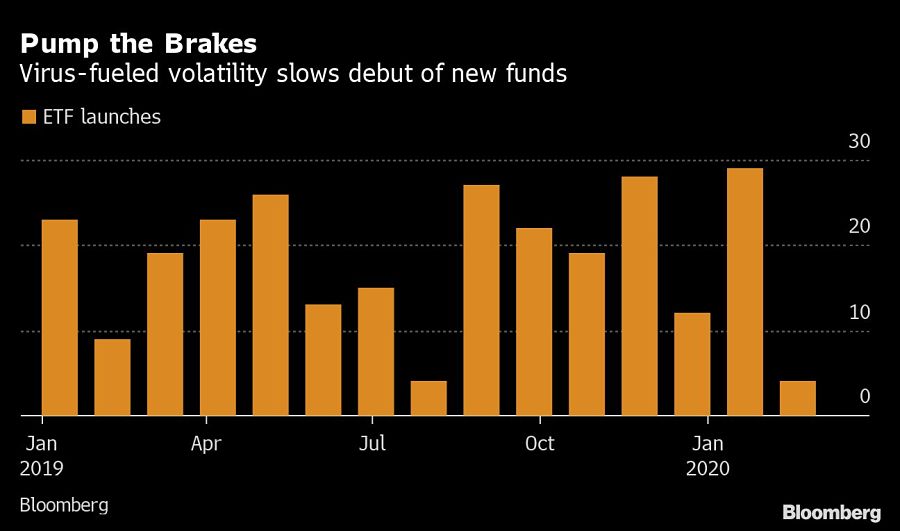

The dramatic volatility in global markets made issuers in the almost $4 trillion exchange-traded fund industry slam the brakes this month.
As the coronavirus pandemic roiled the world, only four new ETFs started trading in March -- the slowest pace since August, according to data compiled by Bloomberg. That’s a steep drop from the 29 funds that were launched in February, the best month since November 2017.
The reason behind the decline is simple: Companies are refraining from ETF debuts amid market turbulence. In addition, it’s harder for salespeople to market their new products when self-isolation measures are making it impossible to hold face-to-face meetings, according to UBS Global Wealth Management’s David Perlman.
“Given the market volatility and just the environment we’re in, it’d be pretty hard to raise assets,” Perlman said. “Advisers and analysts have more pressing issues than reviewing a brand new strategy right now.”

Innovator has been one of the few issuers to brave the waters in March, with a trio of U.S. stock “buffer” ETFs that seek to shield investors from a certain percentage of losses. The Esoterica NextG Economy ETF (WUGI) launched Tuesday.
Amid all the uncertainties, it may be hard to predict the trend of ETF debuts next month. But one issuer, American Century, said Tuesday that the American Century Focused Dynamic Growth ETF and the American Century Focused Large Cap Value ETF -- the first active nontransparent ETFs -- will begin trading Thursday.
The fact that the company delayed the launch of these new types of funds was likely to their benefit, according to Bloomberg Intelligence’s Athanasios Psarofagis. American Century said in May that it would license Precidian’s intellectual property for active nontransparent ETFs, after regulators cleared a pathway for the products in the previous month. The plan to launch Thursday likely shows they think markets will stabilize from here, Psarofagis said.
“They are making a market call and hoping to catch an updraft,” said Psarofagis, an ETF analyst. “Since these are active, their performance track record is going to be key.”

Driven by robust transaction activity amid market turbulence and increased focus on billion-dollar plus targets, Echelon Partners expects another all-time high in 2025.

The looming threat of federal funding cuts to state and local governments has lawmakers weighing a levy that was phased out in 1981.

The fintech firms' new tools and integrations address pain points in overseeing investment lineups, account monitoring, and more.

Canadian stocks are on a roll in 2025 as the country prepares to name a new Prime Minister.

Carson is expanding one of its relationships in Florida while Lido Advisors adds an $870 million practice in Silicon Valley.
RIAs face rising regulatory pressure in 2025. Forward-looking firms are responding with embedded technology, not more paperwork.
As inheritances are set to reshape client portfolios and next-gen heirs demand digital-first experiences, firms are retooling their wealth tech stacks and succession models in real time.
